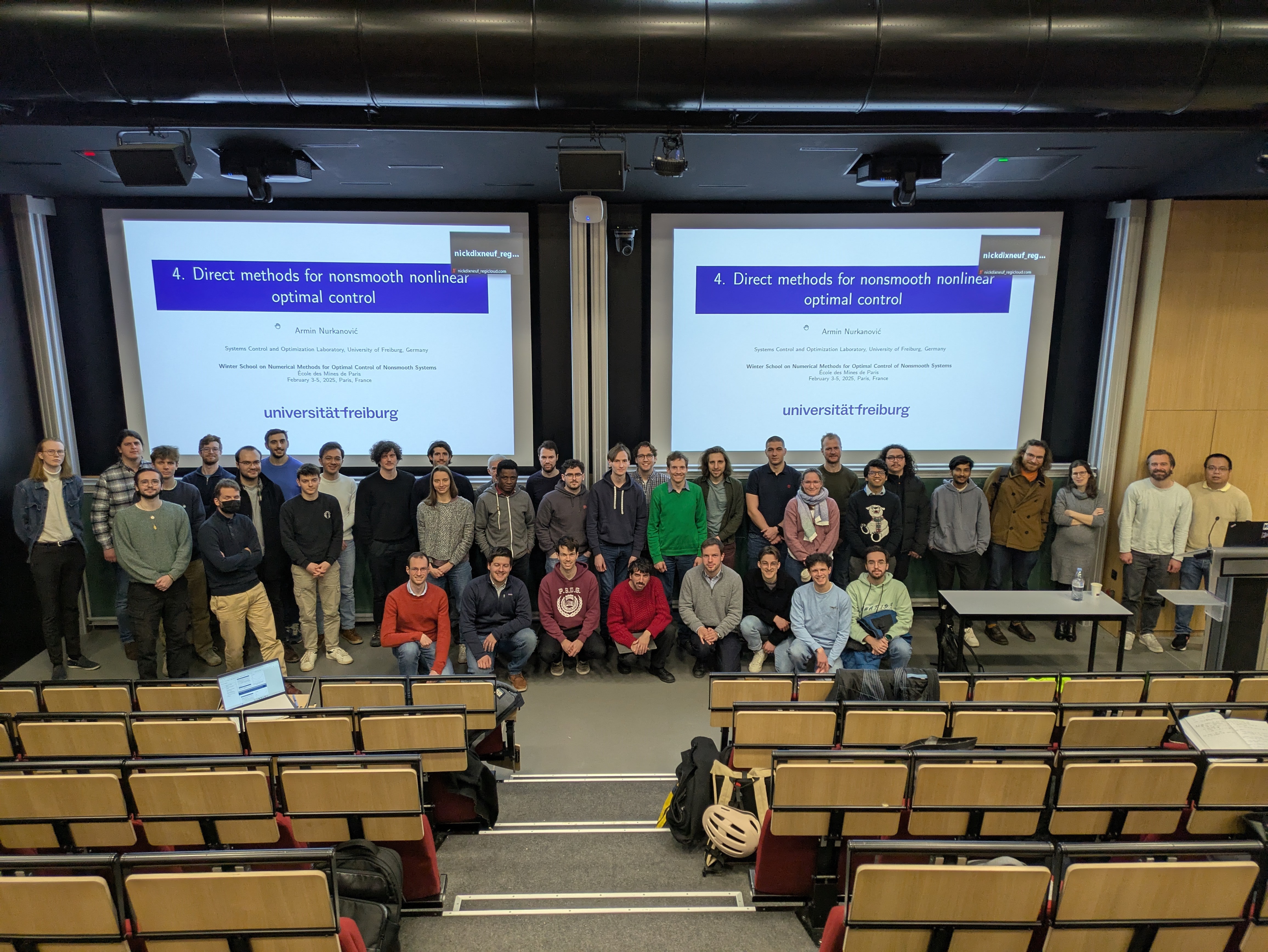Winter School on Numerical Methods for Optimal Control of Nonsmooth Systems
Monday, February 03, 2025, 8:00 - Wednesday, February 05, 2025, 16:00
Mines Paris-PSL, 60 Boulevard Saint-Michel, 75006 Paris
This course is organized by François Pacaud and Armin Nurkanovic. Lectures will be given by Armin Nurkanovic.
This three-day course aims to provide both theoretical background and hands-on practical knowledge in formulating optimal control problems subject to hybrid systems with switches and state jumps. Participants will learn to:
• Formulate and solve optimal control problems for hybrid systems
• Master specialized numerical methods for hybrid system optimization
• Apply these concepts to real-world engineering problems
Lecture slides
- Theory and algorithms for nonlinear programming - (slides, recording)
- Direct methods for smooth nonlinear optimal control - (slides, recording)
- Introduction to nonsmooth differential equations and hybrid systems - (slides, recording)
- Direct methods for nonsmooth nonlinear optimal control - (slides, recording)
- MPECs: nonsmooth modelling and optimality conditions - (slides, recording)
- Numerical methods for mathematical programs with complementarity constraints - (slides, recording)

Detailed course description
Hybrid dynamical systems, which combine continuous flows with discrete switches and jumps, are prevalent across robotics, chemical engineering, biology, mechatronics, and aerospace applications - particularly when if-else statements, switches, and state jumps are embedded in system dynamics. Mathematically, this leads to nonsmooth differential equations requiring a dedicated theory and specialized numerical methods. This course provides an introduction and overview of the state-of-the-art and recent advances in numerical methods for solving optimal control problems subject to hybrid dynamical systems. The implementation of all techniques taught in this course is available in open-source software packages such as CasADi and nosnoc.
The course encompasses an overview and comparison of the different modeling frameworks for hybrid systems, and exact reformulation methods such as time-freezing. From the numerical point of view, we focus on so-called direct methods, which first discretize the continuous-time optimal control problem, and then solve a finite-dimensional mathematical program. The course will first provide a recap of direct methods for optimal control problems with smooth differential equations, which serve as a basis for tailored methods for the more advanced case. We cover this on day one of the course in the lectures:
1. Theory and algorithms for nonlinear programming
2. Direct methods for smooth nonlinear optimal control
We discuss some non-obvious pitfalls and limitations if classical methods are applied straightforwardly. The nonsmoothness requires special care in the time-discretization of such systems, and in deriving the necessary conditions for optimality of the resulting optimization problems. We will shed light on these issues from different angles and review thereby: a) the computation of sensitivities of nonsmooth systems and the Saltation matrix, b) tailored methods for the time discretization of nonsmooth systems, with a focus on the Finite Elements with Switch Detection (FESD) method c) theory of Mathematical Programs with Complementarity Constraints (MPCCs). These topics are the subject of our second day and are covered in the lectures:
3. Overview of nonsmooth differential equations and hybrid systems
4. Direct methods for nonsmooth nonlinear optimal control
Day three is concerned with MPCCs. They arise after the time-discretization of optimal control problems with nonsmooth systems, but they are more difficult than regular nonlinear optimization problems. Moreover, MPCCs can be used to model many other nonsmooth and logical relations, which we will review as well. Finally, we cover standard numerical methods for MPCCs, discuss implementation details, as well as novel active set strategies which have superior theoretical properties and perform better on numerical benchmarks. On this topic we give the following two lectures:
5. Mathematical programs with complementarity constraints: nonsmooth modelling, theory and numerical methods
6. Active-set methods for mathematical programs with complementarity constraints
All lecture slides will be freely provided during and after the course. There will be plenty of time for discussion and answering questions.
Prerequisites
The course is self-contained and can be followed by all quantitative scientists with basic mathematical background (calculus, optimization, and linear algebra). It is recommended for both industrial and academic practitioners of control and optimization as well as for master and PhD students of engineering, computer science, mathematics, and physics.
Registration
Follow this link: https://docs.google.com/forms/d/1nwPQgLQqS6ojx6we_ktvY8ctwKdrum2sFqZ576t--wI/closedform
